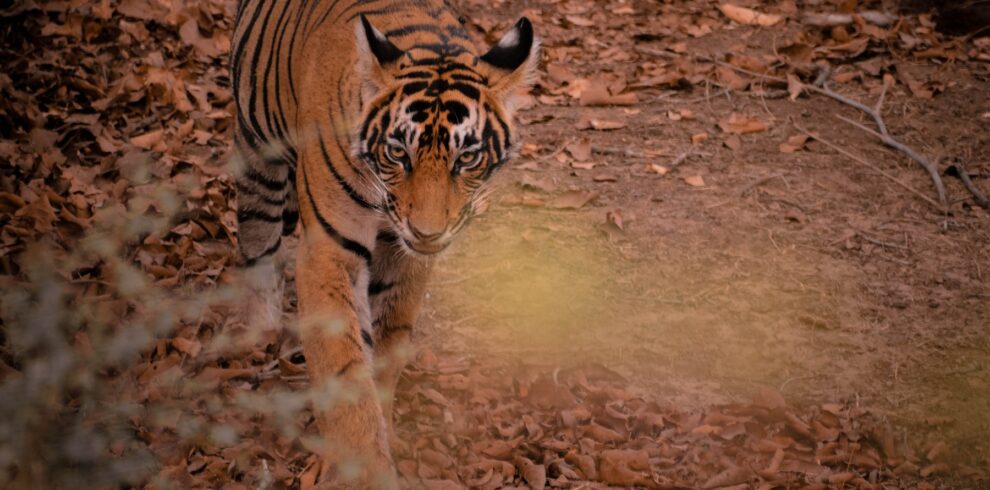Sawai Madhopur
Sawai Madhopur, located in the southeastern part of the Indian state of Rajasthan, is a historic town known primarily as the gateway to the renowned Ranthambore National Park. The town is named after Maharaja Sawai Madho Singh I of Jaipur, who founded it in the 18th century.
The main attraction in Sawai Madhopur is Ranthambore National Park, one of the largest and most famous national parks in India. Spread over an area of 392 square kilometers, the park is home to a diverse range of flora and fauna, including the majestic royal Bengal tiger. Visitors can embark on thrilling safari excursions through the park’s rugged terrain, accompanied by experienced guides and naturalists, in search of tigers, leopards, sloth bears, sambar deer, and various bird species.
Apart from its wildlife, Sawai Madhopur is also known for its rich cultural heritage and historic landmarks. The imposing Ranthambore Fort, a UNESCO World Heritage Site, overlooks the national park and offers panoramic views of the surrounding landscape. The fort, dating back to the 10th century, is steeped in history and houses ancient temples, reservoirs, and palaces that provide insights into the region’s royal past.
Sawai Madhopur town itself offers a glimpse into traditional Rajasthani life and culture, with bustling markets, colorful bazaars, and vibrant street life. Visitors can explore the town’s narrow lanes, interact with local artisans, and shop for traditional handicrafts, textiles, and souvenirs.
The town is also known for its warm hospitality and delicious Rajasthani cuisine, with local eateries and restaurants serving a variety of authentic dishes such as dal bati churma, gatte ki sabzi, and laal maas.
Overall, Sawai Madhopur is a charming destination that offers a perfect blend of wildlife, history, culture, and adventure. Whether you’re seeking close encounters with tigers, exploring ancient forts, or immersing yourself in the vibrant atmosphere of a Rajasthani town, Sawai Madhopur has something to offer for every traveler.
City Tour

- Jan
- Feb
- Mar
- Apr
- May
- Jun
- Jul
- Aug
- Sep
- Oct
- Nov
- Dec

- Jan
- Feb
- Mar
- Apr
- May
- Jun
- Jul
- Aug
- Sep
- Oct
- Nov
- Dec
Cultural Tours
Tourism is travel for pleasure or business; also the theory and practice of touring, the business of attracting, accommodating, and entertaining tourists, and the business of operating tours. Tourism may be international, or within the traveller’s country. The World Tourism Organization defines tourism more generally, in terms which go “beyond the common perception of tourism as being limited to holiday activity only”, as people “traveling to and staying in places outside their usual environment for not more than one consecutive year for leisure, business and other purposes”.
Tourism can be domestic or international, and international tourism has both incoming and outgoing implications on a country’s balance of payments. Today, tourism is a major source of income for many countries, and affects the economy of both the source and host countries, in some cases being of vital importance.

- Jan
- Feb
- Mar
- Apr
- May
- Jun
- Jul
- Aug
- Sep
- Oct
- Nov
- Dec

- Jan
- Feb
- Mar
- Apr
- May
- Jun
- Jul
- Aug
- Sep
- Oct
- Nov
- Dec
Jungle Safari
A is an overland journey, usually a trip by tourists to Africa. In the past, the trip was often a big-game hunt, but today, safari often refers to trips to observe and photograph wildlife—or hiking and sightseeing, as well.
The Swahili word safari means journey, originally from the Arabic meaning a journey; the verb for “to travel” in Swahili is kusafiri. These words are used for any type of journey, e.g. by bus from Nairobi to Mombasa or by ferry from Dar es Salaam to Unguja. Safari entered the English language at the end of the 1850s thanks to Richard Francis Burton, the famous explorer.
The Regimental March of the King’s African Rifles was ‘Funga Safari’, literally ‘tie up the March’, or, in other words, pack up equipment ready to march.
In 1836 William Cornwallis Harris led an expedition purely to observe and record wildlife and landscapes by the expedition’s members. Harris established the safari style of journey, starting with a not too strenuous rising at first light, an energetic day walking, an afternoon rest then concluding with a formal dinner and telling stories in the evening over drinks and tobacco.

- Jan
- Feb
- Mar
- Apr
- May
- Jun
- Jul
- Aug
- Sep
- Oct
- Nov
- Dec

- Jan
- Feb
- Mar
- Apr
- May
- Jun
- Jul
- Aug
- Sep
- Oct
- Nov
- Dec
Multi Day Tour

- Jan
- Feb
- Mar
- Apr
- May
- Jun
- Jul
- Aug
- Sep
- Oct
- Nov
- Dec

- Jan
- Feb
- Mar
- Apr
- May
- Jun
- Jul
- Aug
- Sep
- Oct
- Nov
- Dec